
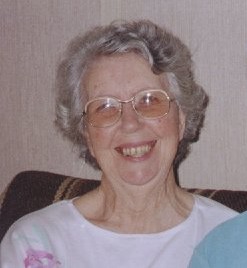 |
Part 1 Interviewee: Dorothy Collins, born 1924 Interviewer: Pauline Curby for Manly Council. Date of Interview: 16th Oct 2001 Transcription: Glenys Murray, January 2002 |
Yes I was actually born at home in a little cottage called The Glen in Lauderdale Avenue, it was on the lower side of Lauderdale Avenue, so the land was very sloping and ran right down to the reserve, at the front of the property and the reserve, of course, just ran down to the waters edge. So I had an absolutely idyllic childhood. I thought I counted in the five homes of which we were the middle home there were twenty-nine children, all round about our own age group. I can remember it very clearly I was born in 1924 so the 1930’s stand out very vividly. I can remember Manly very clearly in those days and at the time I was born our postal address was Manly, later it was changed to Balgowlah and later still to Fairlight, but we never moved house. (laughs).
As I say it was an idyllic childhood, the immediate family
next to my brother and I, there were only the two of us. The immediate
family next door had six children and they had a canoe, a rowing boat
and a little launch with a putt putt motor that was covered by a butter
box in the centre of the boat. In those three boats we practically lived
our summer holidays, we very rarely had shoes on our feet, only to go
on an outing, we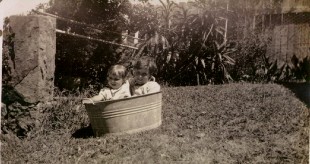 developed leather on the soles of our feet. We had endless hours of fun
in the bush in the front of our place, in the little dinghies and canoes.Looking
back on it we had an immense amount of freedom that the children of today
don’t have. We didn’t seem to have the parental supervision that is necessary
today. We go off in the early morning with a few biscuits and a couple
of sandwiches and a bit of fruit, we’d be gone the entire day until Mrs
Stevens would stand on her veranda and wave a white sheet and we’d say
“oh well it’s time to go home” and we’d go home and we’d all take rowlocks
and oars over our shoulders and up through the little bush track and store
them under her house and go home for a bath and our tea and fall into
bed again. That was a pattern that went on for many years.
developed leather on the soles of our feet. We had endless hours of fun
in the bush in the front of our place, in the little dinghies and canoes.Looking
back on it we had an immense amount of freedom that the children of today
don’t have. We didn’t seem to have the parental supervision that is necessary
today. We go off in the early morning with a few biscuits and a couple
of sandwiches and a bit of fruit, we’d be gone the entire day until Mrs
Stevens would stand on her veranda and wave a white sheet and we’d say
“oh well it’s time to go home” and we’d go home and we’d all take rowlocks
and oars over our shoulders and up through the little bush track and store
them under her house and go home for a bath and our tea and fall into
bed again. That was a pattern that went on for many years.
 Was
there much concern about drowning or were you excellent swimmers?
Was
there much concern about drowning or were you excellent swimmers?
Yes we were all good swimmers, we never had a life jacket between us and when I think of some of the hair raising things we did for example we went on several occasions right out past Dobroyd Point and round Middle Harbour towards Grotto Point where the bombora is. Our only instructions were that we were not allowed inside the buoy making the bombora.
I should hope notNo we were in this little open 16 ft boat, we went right up several times as far as Roseville Baths and we’d have a swim there and do the repeat trip. Several times we crossed right across The Heads and went to Nielson Park. The oldest child amongst us then would have been fifteen or sixteen.
In a little row boat?In a little row boat there’d be
But what about the swell?We just managed that.
I consider that dangerousIt was dangerous when you look back, we never thought anything of it.
Did your parents know that you had actually crossed The Heads? I bet they didn’t.
Yes
Did they?Oh yes, we seemed to be given a lot of responsibility at an earlier
age in those days. We married very much younger and before you were married
you were off and working at thirteen of fourteen, so you didn’t have the
dependence on your parents that you do have these days. They were only
a few occasions that we did do that,  but
mostly our fun was around in North Harbour. One of the loveliest things
that we did, there was a boat called Mistral now it was the original
Mistral, there have been several since that have competed in the
Sydney to Hobart races. The original Mistral was anchored in North
Harbour and it had behind it a sort of a swimming pool. Basically it was
only an oblong of four floating pieces of wood with netting hanging below
it, so that it made it shark proof. He allowed us children to go out there
and use the pool. We thought this was wonderful, it was anchored out in
the middle of the stream. I remember on one occasion we dared my cousin
to swim from this shark proof net back into the shore, which meant crossing
a very deep channel in which sharks had been seen and we doubled dared
him, so he did, he was a very good swimmer. Unfortunately Mrs Stevens
saw this and we were forbidden to use that pool for the rest of the season.
But there was another pool directly opposite “The Glen” where I was born,
it was called Crystal Beach pool, it was built I suppose by the council,
it was quite an established pool, but because it was almost unswimmable
at low tide there was very little water left in it at low tide. They eventually
moved that about 200 yards further east towards Forty Baskets Beach. It
was an established pool there for a while and it was almost exactly opposite
Fairlight Pool. Now Fairlight Pool was our really proper pool, it was
about half a mile from our place and we would run around there before
breakfast and swim.
but
mostly our fun was around in North Harbour. One of the loveliest things
that we did, there was a boat called Mistral now it was the original
Mistral, there have been several since that have competed in the
Sydney to Hobart races. The original Mistral was anchored in North
Harbour and it had behind it a sort of a swimming pool. Basically it was
only an oblong of four floating pieces of wood with netting hanging below
it, so that it made it shark proof. He allowed us children to go out there
and use the pool. We thought this was wonderful, it was anchored out in
the middle of the stream. I remember on one occasion we dared my cousin
to swim from this shark proof net back into the shore, which meant crossing
a very deep channel in which sharks had been seen and we doubled dared
him, so he did, he was a very good swimmer. Unfortunately Mrs Stevens
saw this and we were forbidden to use that pool for the rest of the season.
But there was another pool directly opposite “The Glen” where I was born,
it was called Crystal Beach pool, it was built I suppose by the council,
it was quite an established pool, but because it was almost unswimmable
at low tide there was very little water left in it at low tide. They eventually
moved that about 200 yards further east towards Forty Baskets Beach. It
was an established pool there for a while and it was almost exactly opposite
Fairlight Pool. Now Fairlight Pool was our really proper pool, it was
about half a mile from our place and we would run around there before
breakfast and swim.
 Had
you learned to swim there?
Had
you learned to swim there?
No I learnt to swim when my father threw me in the river at Cobbitty, when I was not quite five and it was sink or swim.
So you didn’t have formal swimming lessons?
No they didn’t have any instructions in swimming, it was just a sort of a natural thing that happened.
Now there were a couple of very bad shark, well shark tragedies at Manly, people dying in the 1930’s. Do you remember these and being frightened hearing about them and being warned.
I don’t remember a shark attack as such in North Harbour.
No, at Manly.
Oh at Manly on the ocean beach, no I don’t recall those at all.
Don’t you, oh. I thought that might have really had an impact on people.
No the first real shark attack I remember was after I was married and had my own family and was living at Seaforth and there was a boy of about eleven taken in Bantry Bay. I don’t remember earlier.
My parents were married in 1919 and I think it was only about 18 months after they were married that they decided to move in from Dee Why where they were living to Manly and they looked for homes in that area along the North Harbour and this place had been built, I think it had just been built. They looked at a place in King Avenue further along North Harbour and it was £1000, I remember my mother telling me. This one was £1100, which was a little bit beyond them, but they fell in love with the place. They were the ones that named it without any imagination The Glen and they lived there all their lives.
What sort of a family home was it? You mentioned about the veranda
It was a nice little cottage for those days, timber, it was made of
timber, everybody used the back door because actually the front door was
at the side of the house and very few people went to the front door. You
went into the back door through a little fernery where my mother had lovely
hanging ferns and things, into a kitchen and laundry combined, there was
the copper, the tubs which had a wooden top with linoleum 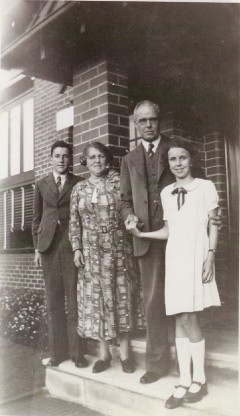 pasted
onto the timber and it had a little brown and white checked curtain hanging
down the front behind which were butter boxes which were commonly used
for everything, in which she kept the potatoes and onions and pumpkin
and things like that, which were kept behind this little curtain. The
kitchen sink had over it a little gas heater which was very modern in
those days so we had hot water running into the sink and we had a kitchen
plate rack, the washing up was done in an enamel bowl, they were rinsed
in the sink in clean water and then put up on this rack to dry. So the
only things we had to dry were cutlery and saucepans and things like that.
There was a gas stove and of course the copper was gas, with a mangle
attached to it.
pasted
onto the timber and it had a little brown and white checked curtain hanging
down the front behind which were butter boxes which were commonly used
for everything, in which she kept the potatoes and onions and pumpkin
and things like that, which were kept behind this little curtain. The
kitchen sink had over it a little gas heater which was very modern in
those days so we had hot water running into the sink and we had a kitchen
plate rack, the washing up was done in an enamel bowl, they were rinsed
in the sink in clean water and then put up on this rack to dry. So the
only things we had to dry were cutlery and saucepans and things like that.
There was a gas stove and of course the copper was gas, with a mangle
attached to it.
Will you explain what a mangle is, for younger people.
A mangle was a wringer, it was two rollers in which you turned a handle and the sheets and towels that were lifted out of the copper with a copper stick, and the copper was boiling water, was lifted out and fed into this machine and the handle turned and it went from that into the first tub of clean water, then it was mangled run back again into the second tub of clean water in which there was a blue, called Reckitt’s Blue, it was a little tiny square of blue some sort of powder, compressed powder, that was put in and made the clothes white and from that it was wrung again for the third time and hung out on the line. So wash day was quite a mammoth job, it used to take all of Monday.
Did your mother get anyone into help her at all or did she have to do it all herself?
No she did it all. We did get a lady to come in to help her clean one day a week, but I was a fair age before that happened. No she used to get down on her hands and knees and polish the kitchen lino which was brown, everybody seemed to have brown lino very depressing.
Probably didn’t show the dirt as much
Our kitchen table had brown lino on it, but the only meal, we ate less
in the kitchen than we did out on our front veranda, which looked over
the water. Now that meant carrying everything through from the back to
the front of the house, we had a traymobile that we used to pile everything
on and it went straight through the house, straight through the lounge
room,  what
I’d call the lounge room and through the main bedroom, my parents room
and lifted down the step onto this very, very large veranda. Now that
features very much in my life because I used to sleep up one end of the
veranda and my brother down the other end on stretcher beds and I had
never slept indoors until I was married at the age of 19 and I felt claustrophobic.
We slept out there in rain, winter, summer, the only time our beds were
moved inside if it was a very bad storm and we did have wooden venetian
blinds that were pulled down and strapped by leather straps onto the floor,
the decking of the veranda. Looking back a large percentage of my childhood
was spent eating or sleeping or just relaxing on that veranda.
what
I’d call the lounge room and through the main bedroom, my parents room
and lifted down the step onto this very, very large veranda. Now that
features very much in my life because I used to sleep up one end of the
veranda and my brother down the other end on stretcher beds and I had
never slept indoors until I was married at the age of 19 and I felt claustrophobic.
We slept out there in rain, winter, summer, the only time our beds were
moved inside if it was a very bad storm and we did have wooden venetian
blinds that were pulled down and strapped by leather straps onto the floor,
the decking of the veranda. Looking back a large percentage of my childhood
was spent eating or sleeping or just relaxing on that veranda.
You didn’t get wet out there at all?
No only if it was a particularly heavy storm, then the beds would be moved inside.
Now talking about the veranda, we’ve got a photo here that you think your father may have taken, in fact two photos joined together so that you get a panorama of the view from the veranda. Can you just take us through what you can see from the veranda?
Yes, well from the veranda we overlooked North Harbour, we were nearly opposite Forty Baskets beach, just a wee bit further along. We could see North Head very clearly, the tip of South Head jutted above Dobroyd point that we could see, so we got to know over the years, we knew every Manly ferry, we could identify which one it was, we knew the timetables, whether they were on time or what ferry it was. One of my biggest memories, we got to know a lot of the shipping that came and left through the Heads, one of my most vivid memories was the day that the South Steyne arrived under its own steam from Scotland where it was built, it came out with false bows both ends of it. I said it was a beautiful butterfly that emerged from its cocoon, when it came because it was an ugly cumbersome looking lump of wood when it came through the Heads.
That was to protect it on its ocean voyage?
That was in 1938.
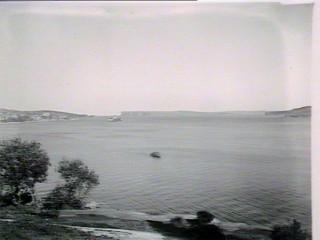 Do
you remember it coming through the Heads?
Do
you remember it coming through the Heads?
Oh yes we were sitting having breakfast as it came through the Heads, there was a lot of pre publicity about it, because this was the first one that had sailed under its own steam all the way from Scotland and it was a banana shaped boat and it featured largely in my life. As I say I was 14 when it arrived, it was considered the beauty of the fleet at that time. It had a snack bar and all mod cons for those days. Later when I started work at 15 in the city, I always travelled on the South Steyne which was the quarter to eight ferry from Manly Wharf and we had a coterie of friends that used to all travel on that boat and we always sat outside at the back and it became quite a ritual over the years. So the South Steyne holds very dear memories for me. The other boat that I remember vividly was the Awatea now the Awatea was a green painted boat with red funnels, it travelled between New Zealand and Australia as a passenger boat and it was captained by Captain Davey who was Jack Davey’s father.
Jack Davey was a radio personality of the 30’s, 40’s and 50’s for people who don’t know.
He was an absolute stickler to arrive right on the dot. He was called 8.01 Davey because his bow would come around that North Head at 8.01 not 8.0 or 8.02 every week, it would come in and he would always give the same signal, estimated time of arrival 8.01 and now that Awatea was a very well known boat. When the war broke out it was commandeered by the army or the navy I don’t know which one, but it was camouflaged and all its beautiful red and green colours covered with grey and it served quite a long time in the Mediterranean and Malta, North Africa it was finally sunk, torpedoed or bombed. That was like losing a member of the family the old Awatea because we knew it so intimately well, even though we had never been on it.
Did you ever sit on the veranda with binulars and look out?
Yes we had binolculars, yes. The other memory I can remember just...

We’re looking at this photo again
To the left of the photo is little Manly and on that North Head was the Quarantine Station was then still being used as a quarantine station and every now and again you would see a big ocean liner would come in and instead of turning towards Sydney would turn into there and anchor and a yellow flag would be put up on the mast and that ship was in quarantine. The passengers were off loaded and were kept in isolation for as long as necessary and the ship was not allowed to move from that part.
One other thing I remember vividly about our veranda was when I was only about 5 or 6 I wouldn’t have been much more the hill opposite us which is Dobroyd Point and is now covered in very, very wealthy beautiful homes, that was our playground over there. It was all bush except for a group of half a dozen little houses down on the beach round Forty Baskets and one lone house right up the top of the hill and we knew the boy who lived in that house.
What family was that?
That was the Johansenns and he was Theo Johansenn and he went to Manly West School a long, long bike ride through the bush, no buses, right to Condamine Street, down a very steep hill up another steep hill, down another steep hill to get to school every day.
At Manly West School
At Manly West, he was a very good friend of my brothers, but this day I am speaking of I was about five or six and a bush fire started right down the western end of Dobroyd Point and it burned all day and well into the night. It burned the entire hillside out. Grotto Point lighthouse was on the other side, we couldn’t see it from our veranda it was saved, they managed to save the houses but the entire bushland was burnt.
The fire brigade presumably rushed there, but was there anything like a bushfire brigade in those days, I’ve never heard it mentioned round that area.
I don’t remember that. There would have been fire brigades over there.
Yeah there would, but were there volunteers to help?
I don’t remember, I don’t know, I was too young to know at that stage.
No of course
I remember also very vividly we’d often help, North Harbour in those days when I was a child was still able to be fished commercially and the commercial fishermen used to come out in their rowboats and row in a circle and then land on one of the beaches and haul the nets in. Now this would have been during the Depression years when things were very tight financially with most of the families around and we children used to find which beach the fishermen were working on and we’d go and we’d help pull the nets in. I suppose we were more trouble than we were worth, they’d end up with a flurry of fish on the beach and they’d sort them out roughly there and I think anything they didn’t want they’d give us.
So netting was allowed there at that stage?
Netting was allowed.
Only at certain times of the year
No I think it was all year, but it was controlled netting, They never seemed to use the same beach twice running and I don’t remember what age I was when it finished, but I was still a child when it was outlawed. It was not allowed to be fished then.
Do you remember when North Harbour was reclaimed? You would have been a teenager then.
Yes I can remember that very clearly.
Five or so acres were reclaimed
Mm down
the, right down the end of North Harbour there was a little bridge crossing
a creek which is still there, very high, high up bridge and there was
a little shop there to. We called them the mud flats, at low tide that
whole area at the end of North Harbour was mud and it used to be smothered
in soldier crabs, it was the most amazing sight and sound you could hear
them move from quite a distance there must have been millions of them
and we used to love walking amongst the crabs and shooing them away. It
was a sad day when they started to reclaim and fill in that whole area.
I can’t answer for adults or the people, but we children regretted it very much, because it was sort of a natural part, you could let the mud squelch through your toes and we had my brother and I had two very dear friends who lived over opposite down, there was a group of houses near that little bridge and we spent a lot of time with them and playing round the mud flats, catching crayfish in the, oh yes. We used to catch crayfish in the creek there that ran into North Harbour and one time my brother and I caught a little, I suppose you’d call him a yabby now he was only about six inches long, we took him home and without thinking put him in our fishpond which we had at the back on one of the levels at the back of The Glen. The goldfish suddenly started disappearing and my father kept saying “I can’t understand what’s happening to the goldfish” and after about six months of losing some of his goldfish he decided to clean the whole pond out and he thought the water must have been contaminated and when he cleaned the pond out there was this great lobster. We were very unpopular.
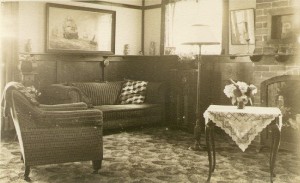 Now
could we go back to your house for a moment did you have electricity in
your earliest memories.
Now
could we go back to your house for a moment did you have electricity in
your earliest memories.
Yes we had electricity when I was a child, but in all the bedrooms were still the gas fixtures. The electricity had only just been put on. The gas fixtures stayed all my childhood.
Was the dunny down the backyard
No we had a septic tank, we had an indoor toilet but there were still a lot outdoor toilets then. No we had a septic tank which was down on the same level as the veranda.
Another thing I remember about the veranda, we were burgled three times in my childhood memories. We would always come in the back door and I can remember one time when I was about 7 or 8 as we came in the back door we saw two men leap over the veranda railing and disappear down into the bush…..
(Break in Tape...)
It was a very tempting isolated type of place.
That of course was the Depression years you’re talking about then. Do you think that that had anything to do with it perhaps?
With the robberies?
Yes
I doubt it. We never used to have anything of value in the place, but they used to leave it in a terrible mess.
Before we talk about the Depression, I’d just like to go back to the oldest child of your family, your baby brother who died.
He died before I was born. Yes my mother and father married fairly late in life I think Mum was about thirty six and Dad was about thirty three when they married and they had 3 children in very quick order. The first one was my brother Douglas who died when he was 13 months old of gastroenteritis and my mother was pregnant with my now living brother Donald. I think she was about 4 or 5 months pregnant with him when Douglas died.
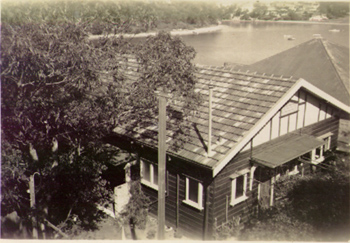
Did they ever talk about that much, because that’s the disease of babies of the nineteenth century, slum suburbs, you know that sort of thing was very common, but it wasn’t so common by the 1920’s.
It still was fairly common apparently, there was very little understanding of how to treat it and there was very little access to baby clinics. I remember Mum saying that when she had Donald as a baby living in this Glen in Lauderdale Avenue she had to travel to North Sydney, no to Mosman was the nearest clinic then. It was a daylong trip by bus and tram and goodness knows what.
There was a lot of doctors in Manly of course
He was put into the Crescent Private Hospital and but he died after about two or three days.
Not Manly Hospital
No, the Crescent Private Hospital which was on this side, closer to us.
It must have had a terrible impact on their lives.
It did, Mum used to always maintain that my brother, my brother Don is quite a serious boy, man. He was always a serious child and my mother used to maintain that is was because she was so distraught while she was carrying him. Whether its so or not I don’t know. I came along and I was the exact opposite.
Now your father was a solicitor and did he practice in the city?
Yes
So would he have gone in on the ferry every day?
Yes
How did he get from where you lived to the wharf.
By bus down to the wharf
Or tram
No bus there was a bus along Lauderdale Avenue, there was a private bus.
So your earliest memories are of private buses
Private bus, yes I was quite a good age. I remember when
I had my adenoids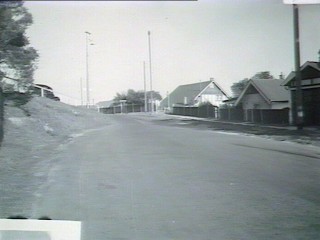 out. I had it at this Crescent Private Hospital with just a little whiff
of anaesthetic in the morning and then I was still in my pyjamas and dressing
gown walked down to where the bus went about 2 or 3 hundred yards got
the bus home. He stopped half way for me to be sick in the gutter and
I went home and was put to bed. I didn’t stay in hospital at all. But
that was a little private bus with seats around the wall, everybody faced
everybody else and we all knew the driver and he knew everybody along
the route. I was quite a good age before the government buses started
running along there.
out. I had it at this Crescent Private Hospital with just a little whiff
of anaesthetic in the morning and then I was still in my pyjamas and dressing
gown walked down to where the bus went about 2 or 3 hundred yards got
the bus home. He stopped half way for me to be sick in the gutter and
I went home and was put to bed. I didn’t stay in hospital at all. But
that was a little private bus with seats around the wall, everybody faced
everybody else and we all knew the driver and he knew everybody along
the route. I was quite a good age before the government buses started
running along there.
I just find it interesting that you’ve mentioned the private hospital at the Crescent twice. Do you think it was that people who earned a bit of money, like your father obviously a middle class person being a solicitor. Was it the fact that they would go to a little private hospital rather than Manly Cottage Hospital
It was closer and that would have been a lot easier. Manly Hospital was a great distance from us in those days. I never saw Manly Hospital until many many, many years after, so I can’t answer that.
No
Everybody seemed to use, there were a lot of little private hospitals around, even on the Eastern Hill where the Manly Cottage Hospital is, the people next door to us certainly weren’t wealthy, nobody was wealthy in those days really
But there were wealthy people in Manly if you don’t mind me saying. But you probably didn’t know them.
No we would have probably been regarded as quite well off.
Comfortable, now talking about being comfortable, what about the Depression, you’d have strong childhood memories of the impact of that I’m sure.
Yes, I do. I would have been about 5 or 6, just starting
school, when the Depression started to hit. So I can remember vividly
all through my primary school at Manly West School.
Who was saying that your Dad or your Mum?
Dad
Your Dad
And I get another Kromhyde sole glued on.
Sort of a rubbery substance isn’t it?
A rubber substance used to be used. But a large percentage of the children used to be shoeless even in the coldest winter, the girls used to have cotton frocks that they would wear winter and summer and little they always seemed to be threadbare cardigans I suppose they were hand me downs darned on the elbow I can still see that.
And washed within an inch of their life, I suppose
Yes and they’d be blue with cold. I used to also feel guilty because I had a uniform, I had a three pleat, box pleated and a white blouse and I used to take my shoes off before I got to school, because I felt I didn’t fit in. Also I had butter and jam on my bread for lunch and most of the children had dripping if they were lucky to have any lunch at all. I used to swap, never told Mum, but I felt more comfortable that way.
So you were seeing really obvious signs of poverty with the children there
There was terrible poverty and the family next door to us, I can remember the father when he lost his job crying and I’d never seen a grown man cry and I don’t know whether it was justified or not but nearly all the people around our area were very anti John Lang.
Jack Lang, oh were they? Why was that?
I don’t know
No because you were a child
But I remember when the bridge opened I was 7.
The Harbour Bridge?
The Harbour Bridge, we walked across the Harbour Bridge .
As a school group
No family group, stood in the sun for ages, the queue went right back to the Quay where we got off the ferry and we had to then, there was a miles walk up until you got onto the actual span of the bridge. It wasn’t until we reached North Sydney and we went into a little tea room there, I was exhausted, I was tired out and the news boy came outside screaming out “extra, extra” about the bridge opening by De Groote. Now we’d been there, it just shows you how communication has changed all together. There were no radios, no phones, like mobile phones, it wasn’t until hours later until the paper came out and we heard. I can remember my father who was a most staid and portly business man leaping to his feet and saying “ good on him, good on him, that’ll poke him in the eye” and there was great delight that J T Lang had unable to carry out his promise of opening the bridge.
So you walked across the bridge, you went the day it was opened, the 19th March
Yes
Oh right, in other places school groups went across the day or two days before. You’d be too young I suppose but do you remember hearing anything about the New Guard?
No I don’t remember them in our area but I remember hearing about De Groote belonging to a radical group called the New Guard. I thought he was like Errol Flynn, ridden in on his horse and slashed the ribbon. It was quite dramatic.
You didn’t know if your father supported the concept of the New Guard
No, no I know there was a lot of ill feeling amongst the neighbours just around us against JT Lang and I didn’t know why. I thought he was the man that sacked the man next door. The one that lost his job.
Did you hear about Bertie Stevens who had been a clerk at Manly Council when he was young. He was the next Premier.
No
You don’t remember, so during these Depression years do you remember people coming around trying to get odd jobs or selling things?
Yes, yes there was, I can remember men coming with trays held on with leather straps around their necks and on the trays were match boxes, shoe laces and I can remember my mother had a whole drawer full of shoe laces which she’d never use, because she couldn’t bear to turn them away. They all seemed to be very, very down at heel. They’d go from door to door continually. Those are my personal memories of the Depression.
During these years did your father keep a job the whole time?
Yes, he had his own, he was in partnership with a Mr Vine Hall, it was called Ferguson and Vine Hall. His offices were in O’Connell Street, but he and his sister who was married supported his widowed mother and spinster sister all their lives. I remember they each gave them a pound a week, which was a lot of money to have to give each week, his mother and sister.
But old age pensions had been in introduced much earlier
There was no pension there. They had a little cottage at Dee Why and they depended on that 2 pounds a week.
So you stayed at Manly West Public School throughout your primary years. Where did you continue after that?
That’s a sore point with me, I somehow, I don’t know why, I was promoted half way through second class into third class, so that I was always the youngest in the class, so I thought I would be repeating third class, but they didn’t they kept putting me up, so I was only just eleven when I sat for the QC (Qualifying Certificate) at Manly West.
Qualifying Certificate end of primary school exams
I was just eleven and there were only two high schools then available to girls. Fort Street was the cream of schools, that was over on Observatory Hill in Sydney, the next one was William Street High which was near Kings Cross. I qualified only one of two children from Manly West School, I qualified for William Street High School and I was ecstatic, it was wonderful and my father was all for me taking up the trip. But you can imagine the long trip to William Street High School, a bus trip to Manly Wharf, a 35 minute boat trip, a tram trip from the Quay up to Kings Cross and the same thing returning at night and my mother said “she’s too young”. I was a very tiny child too, “she’s too young, she’s only going to get married, far better that she knows how to cook and wash and iron and sew, so she goes to Manly Domestic Science School”.
 I
never forgave, Don was given the privilege of going to university and
studying law. That was the usual thing. In those days the boy was the
one who got the education.
I
never forgave, Don was given the privilege of going to university and
studying law. That was the usual thing. In those days the boy was the
one who got the education.
So you went to Manly Domestic Science School, so even as an eleven year old you felt the injustice of it.
I did I was terribly disappointed that I wasn’t allowed to go to high school, but looking back it was probably a good decision, because it would have been an enormously long day and I was a very young child and in wintertime it would have been dark before I got home and travelling from Kings Cross wasn’t considered very savoury even in those days, but I did feel the injustice that Don was given the chance.
Did your father feel, as you said he wanted you to go but your mother thought that education wasn’t really for girls.
I wanted desperately to study medicine, but I was in the first intake into Manly Domestic Science School - in 1936.
Oh right, and before that it had just been primary school, this was the first year of secondary students.
I don’t know this is the building that is there now.
It was considered state of the art, the whole lower floor was cookery
room, a real little flat that you had to learn to clean, a laundry and
sewing rooms and it was compulsory the first year everybody had to do
cookery and sewing, then you branched off and a certain percentage branched
off to do a business course where you took shorthand and typing and business
principles and the others kept on with the domestic science.
Go to Part 2 of this interview